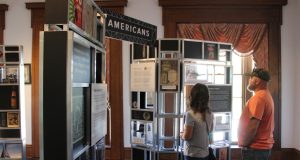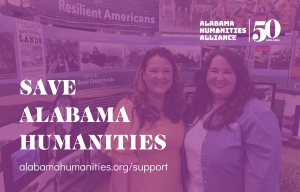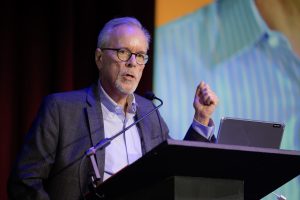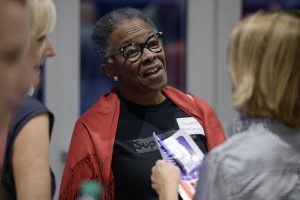October 15, 2025 — In 2026, Americans will celebrate the 250th anniversary of our country’s first founding document, the Declaration of Independence. To commemorate, the Alabama Humanities Alliance will offer an extra slate of grants and programming in 2026, helping Alabamians place the past in context, consider our present, and imagine what our shared future might look like.
Among AHA’s “250” highlights: Grant offerings to help Alabamians reflect on America’s founding and connections to today; two new Smithsonian traveling exhibits; American Village will host the 2026 edition of AHA’s annual Alabama History Day contest; new Road Scholars will present talks related to America’s founding era; and a fall Healing History convening aims to bring Alabamians together.
“We are very excited to bring an Alabama perspective to commemorations of our nation’s 250th anniversary,” says Chuck Holmes, AHA’s executive director.
“This work builds on what we do year in and year out — supporting opportunities for lifelong learning, impactful storytelling, and civic engagement. We know that when folks engage with history, culture, community, art, folklore, and storytelling — we learn more about who we are, where we come from, and what brings us together.”
AHA’s “America at 250” programming
- AHA Grants: In 2026, Alabama Humanities’ grants program will prioritize applications that help Alabamians use the humanities to explore our nation’s founding history and principles. These include opportunities to reflect on how Alabamians have pursued a more perfect union, and to engage in community conversations about our shared future. Over 50 years, AHA has awarded more than $13 million to Alabama organizations.
- Americans: Adapted from an exhibition at the National Museum of the American Indian, Americans focuses on four historical events: Thanksgiving, the life of Pocahontas, the Trail of Tears, and the Battle of Little Bighorn. The exhibit invites us to consider new narratives about each of these events, and reveals the richness and complexity of our American story. AHA will bring Americans to five communities across Alabama, beginning in Fall 2026.
- Many Voices, One Nation: E pluribus unum: Out of many, one. Inspired by a permanent collection in the National Museum of American History, Many Voices takes visitors on a cultural journey through the rich and multifaceted stories that make up America. Starting on Independence Day, this exhibit will be on display in Dale and Washington counties. There, local hosts will customize the exhibit to reflect the stories, and people, of those respective regions of Alabama.
- Alabama History Day at American Village: AHA’s annual Alabama History Day has a special, and apt, setting for its 2026 state contest: American Village. History Day engages students (grades 6-12) in robust and creative historical research. This year’s contest theme is “Revolution, Reaction, Reform in History,” and participating students will present their projects on American Village’s dynamic campus, which brings America’s founding history to life.
- Road Scholars 250: AHA is expanding its popular Road Scholars Speakers Bureau to add new speakers with topics related to America’s, and Alabama’s, founding history. AHA’s Road Scholars provide fascinating talks at town libraries, senior centers, historical societies, and more. New “250 Scholars” include the likes of Mike Bunn, director of Historic Blakeley State Park; Gary Furr, author, musician, and pastor; and Christine Sears, associate professor of history at UAH.
- Encyclopedia of Alabama resources: The EOA is a free, online resource covering all things Alabama. For 2026, staff have curated a new collection called “Alabama and America’s 250th Birthday.” Explore stories about Revolutionary War heroes in Alabama; Native American life in the state during America’s colonial era; the historic origins of Alabama’s boundaries; and iconic figures like William Bartram, the Marquis de Lafayette, and Tecumseh.
- Healing History: An Alabama Convening: AHA kicks off its “America at 250” programming early, with this October 27, 2025, convening in Montevallo. Designed as a day of imagination and inspiration, attendees will hear from fellow Alabamians who are engaged in work that reflects AHA’s Healing History initiative. The goal is to learn how Alabamians are examining our shared past in order to bridge divides and bring communities together today.

Share our “AHA: America at 250” flyer.
AHA’s 250 partners
None of these initiatives would be possible, of course, without the work of many partners across Alabama, many of whom are putting together incredible “America at 250” programming of their own.
Thank you to AHA’s initial 250 partners, including: American Village, Caroline Marshall Draughon Center for the Arts and Humanities, David Mathews Center for Civic Life, Dale County Council of the Arts and Humanities, Encyclopedia of Alabama, National History Day, Smithsonian Institution’s Museum on Main Street, and Washington County History Museum.
The Alabama Humanities Alliance is especially proud to be a partner organization for America250AL at American Village, the state’s designated Semiquincentennial celebration capitol. America250AL offers celebration grants, community toolkits, a Semiquincentennial Schools program, and an oral history effort called “Share Your Story.” To learn more about these offerings, and more, visit america250al.org.
Help make this all happen
 Alabama Humanities remains committed to its Semiquincentennial commemorations, but AHA will need help from individuals and organizations across the state to make it happen. This is due to abrupt, and deep, federal cuts to AHA’s funding in 2025.
Alabama Humanities remains committed to its Semiquincentennial commemorations, but AHA will need help from individuals and organizations across the state to make it happen. This is due to abrupt, and deep, federal cuts to AHA’s funding in 2025.
Since 1974, AHA has been part of a federal-state partnership to promote the arts and humanities across the United States. In that time, AHA has used federal dollars annually appropriated by a bipartisan Congress to support its statewide grantmaking and local programming in communities across Alabama.
In April of 2025, however, the U.S. Department of Government Efficiency (DOGE) terminated AHA’s longstanding partnership with the National Endowment for the Humanities, eliminating what amounts to two-thirds of AHA’s annual funding. Since then, we have been deeply grateful for support from individuals, corporations, foundations, and state lawmakers that has helped AHA preserve much (though not all) of our statewide offerings.
To support AHA’s 2026 programming, donate at alabamahumanities.org/support.
About the Alabama Humanities Alliance
Founded in 1974, the nonprofit and nonpartisan Alabama Humanities Alliance has served as a state affiliate of the National Endowment for the Humanities. Through our grantmaking and public programming, we promote lifelong learning, impactful storytelling, and civic engagement. We believe the humanities can bring Alabamians together and help us better understand the communities we call home.
Photo at top: Residents of Ozark, Alabama, gather for the opening reception of a Smithsonian traveling exhibit in 2024. For America’s Semiquincentennial, AHA will bring two new Smithsonian exhibits to the state in 2026, which will help Alabamians explore the rich and complex history of our nation.



 On August 25, nearly 60 people arrived early to Red Mountain Theatre, to participate in
On August 25, nearly 60 people arrived early to Red Mountain Theatre, to participate in